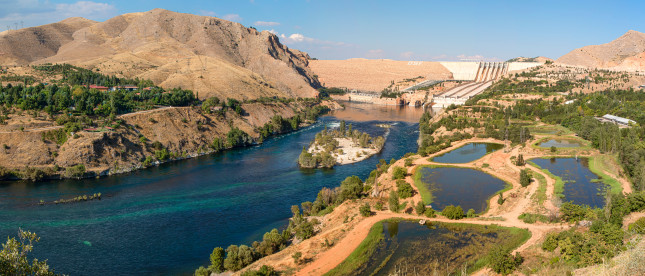-
New Analysis by Peter Schwartzstein: How Water Strategizing is Remaking the Middle East
October 27, 2022 By Wilson Center Staff
In the run up to COP 27 in Sharm El-Sheikh, Egypt, the first summit of its kind to be hosted in the region, water is rising on the agenda, and for good reason. In a new essay for the Wilson Center, Global Fellow Peter Schwartzstein explores how governments across the Middle East are approaching a world with less water – and to what effect. Drawing on a decade of environmental reportage from the Middle East, Schwartzstein sketches out how, why, and with what consequences states have adopted often dramatically divergent strategies.
In the article, Schwartzstein highlights three major state strategies, or at least approaches, to water in the Middle East – dams, desalination, and “business as usual.”
Dams are the centerpieces of upstream Iran and Turkey’s strategies. These countries have built hundreds of dams on almost every available waterway, which have collectively bolstered their rural economies and food security. Schwartzstein attributes their preference for – and, until recently, partially successful rollout of – this strategy to their unique blend of geographic advantage, relative financial strength, and military toughness. But as climate stresses and shocks intensify, the question is whether this approach might have outlived its usefulness.
How Water Strategizing is R… by The Wilson Center
Israel and the Arab Gulf states, on the other hand, have gone all in on desalination. Their wealth has facilitated a largely successful transformation from impending water poverty into well-resourced “artificial upstreamers of sorts.” However, Schwartzstein states that such a strategy can be as tricky for others to replicate as that of Turkey and Iran’s, and that it carries many more challenges than its proponents seem to imagine. For example, “desalination facilities are so energy intensive that the Saudis use up to 20% of all domestically consumed oil and gas to power the country’s facilities,” he writes.
Finally, Schwartzstein assesses the approaches of the region’s ‘strugglers” – those who are suffering from either absolute water scarcity, such as Yemen and Jordan, or merely diminished circumstances after millennia of plenty, like Egypt and Iraq. Most of these states have been pursuing a kind of non-strategy in sticking with ‘business as usual,’ although Schwartzstein suggests that some among this group might slowly be wising up to the need for dramatic new paradigms. In these cases, a number of regimes are trying to ‘re-write narratives’ to accustom their populations to drier futures.
In piecing together what he sees as the region’s principal approaches to water, Schwartzstein ends with a brief look at whether this strategizing is likely to culminate in more cooperation or confrontation over time. And while he pushes back against the often overblown ‘water wars’ rhetoric – and acknowledges the lengths to which states have gone to avoid water-related clashes to date – he isn’t wholly optimistic.
Photo Credit: Panoramic view of the Elazig Keban Dam, Turkey, courtesy of emrahh/Shutterstock.com.
 A Publication of the Stimson Center.
A Publication of the Stimson Center.



